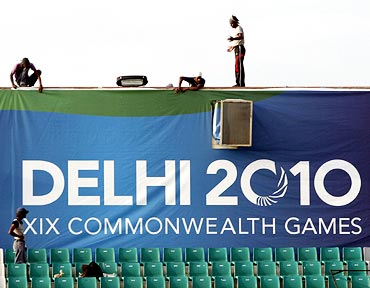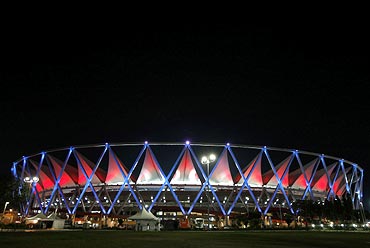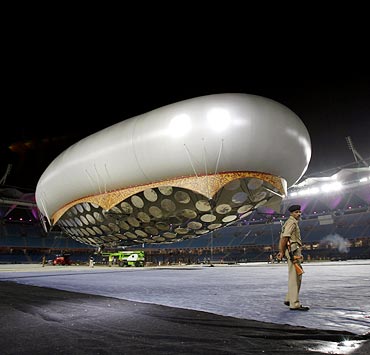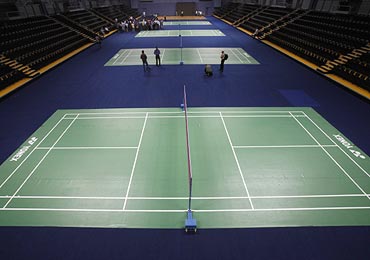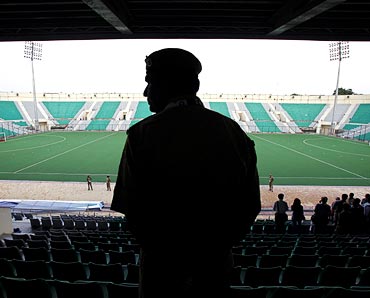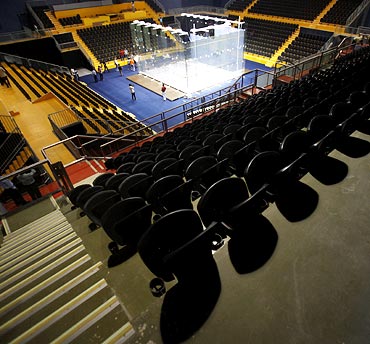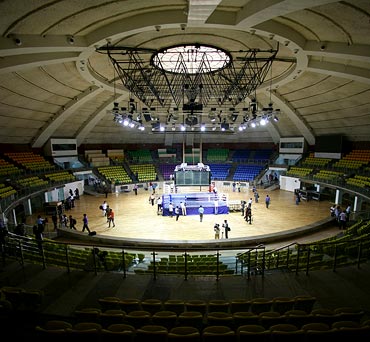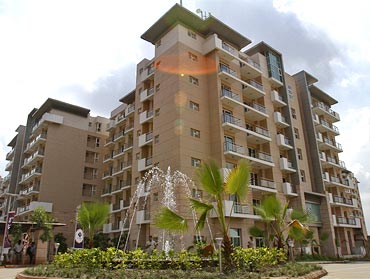 | « Back to article | Print this article |
Kalmadi and co miss another deadline. What a pity!
Security agencies could not ensure a complete lockdown of all Commonwealth Games venues, including Jawaharlal Nehru Stadium, till midnight on Friday as authorities failed to finish work at some of the facilities.
Union Home Minister P Chidambaram had on September 23 issued a stern warning to organisers to complete the work at stadiums by Friday night and hand them over to Delhi Police, the nodal security agency for the Games, for lockdown at midnight.
Sources said a complete security lockdown of some of the venues, including the main Games venue of Jawaharlal Nehru stadium, could not be put in place last night as finishing works were not complete there.
Kalmadi and co miss another deadline
"The work is on at Jawaharlal Nehru Stadium and some other venues. In many venues, we have imposed the lockdown. We expect to take over the remaining venues by evening," a senior official said.
Sources said the security personnel are facing difficulties while guarding the Commonwealth Games village and other venues due to frequent movement of labourers who were engaged for different unfinished tasks.
Ideally, they said, a complete security lockdown should be put in place a month before the event is to commence.
However, they said, security was in full force and there was no need to worry. The initial plan was to have a lockdown from September 15 but it was extended to September 22 midnight, which also could not be met.
Kalmadi and co miss another deadline
The Games Village has become operational without a complete lockdown as athletes have started arriving, the official said, adding they have, however, sanitised the area before the delegates came.
A large number of armed policemen, including paramilitary personnel, have been deployed across the stadia and village. Sophisticated gadgets have also been installed at the stadia.
The security has been stepped up across the city after Sunday's firing incident at Jama Masjid that injured two Taiwanese nationals.
Kalmadi and co miss another deadline
Delhi Police have conducted various drills, including anti-sabotage checks once they take over possession of the venues, the official said.
Concerns were earlier raised about the delay in handing over venues to security agencies as some quarters felt that it would hamper the security preparations.
Delhi Police Commissioner Y S Dadwal, however, had downplayed the delay and said the force was prepared to handle the security issues related to the sporting extravaganza.
"We know the stadia and surrounding areas. We know the city very well. So securing them or other areas will not be a problem," Dadwal had said when asked whether the delay in completion of Games projects was compromising security preparedness.
Kalmadi and co miss another deadline
Heli-borne snipers, four-layered security cordon around Commonwealth Games venues and exclusive lanes for Games vehicles were among the components of the mammoth security plan for the event.
The security plan prepared for the mega event, which will see participation of around 8,500 athletes from 71 countries competing in 17 events, also envisages snipers on rooftops, commando hit teams and expert groups to tackle any chemical, biological, radio-active or nuclear attacks.
Air Force will provide surveillance from the skies. Heli-borne assault teams will also be deployed to thwart any terror strikes.
Kalmadi and co miss another deadline
"We are closely working with central Intelligence agencies. The Air Force will be surveying the airspace. We will have heli-borne snipers patrolling the skies," the official said.
According to the plan, the venues, Games Village, practice and parking lots and the Indira Gandhi International Airport where athletes arrive will have a four-layered security cordon.
At the outer cordon, the traffic will be stopped and access controlled. At the middle cordon, security-men will channelise the spectators to their designated seats while in the inner cordon, barcode-reading of tickets will take place and spectators' photographs taken.
Kalmadi and co miss another deadline
At the centre would be an exclusion zone, which is in the 30-m-radius of the stadium, where spectators and others will have to go through door-frame metal detectors and X-ray scanning besides manual searching.
Mobile Quick Reaction teams will be deployed on the outer perimeter of the venues besides a close watch through CCTV surveillance.
The Games village will also have a similar elaborate security arrangement. The boundary of the village will have a three-metre high perimeter wall, a 1.5-m-high iron grill on top of it, mobile QRTs and CCTV surveillance system.
Kalmadi and co miss another deadline
Elaborate arrangements are also made for the entry for athletes and vehicles into the village. After entering the village following a thorough check, the athletes can freely move around the residential and dining halls.
For vehicles, the drivers will have to pass through radio frequency identity checking where the number plates are checked to see whether are authorised to enter the place.
There is a boom barrier and it will be opened only after the vehicle clears the radio frequency checking. But if somebody tries to forcefully enter, there will be a tyre-killer and even if the vehicle clears it, the road blocker will block the passage of the vehicle.
"All food prepared and served for Games guests in hotels will be sorted by security personnel and tasted by food experts," the official said.
